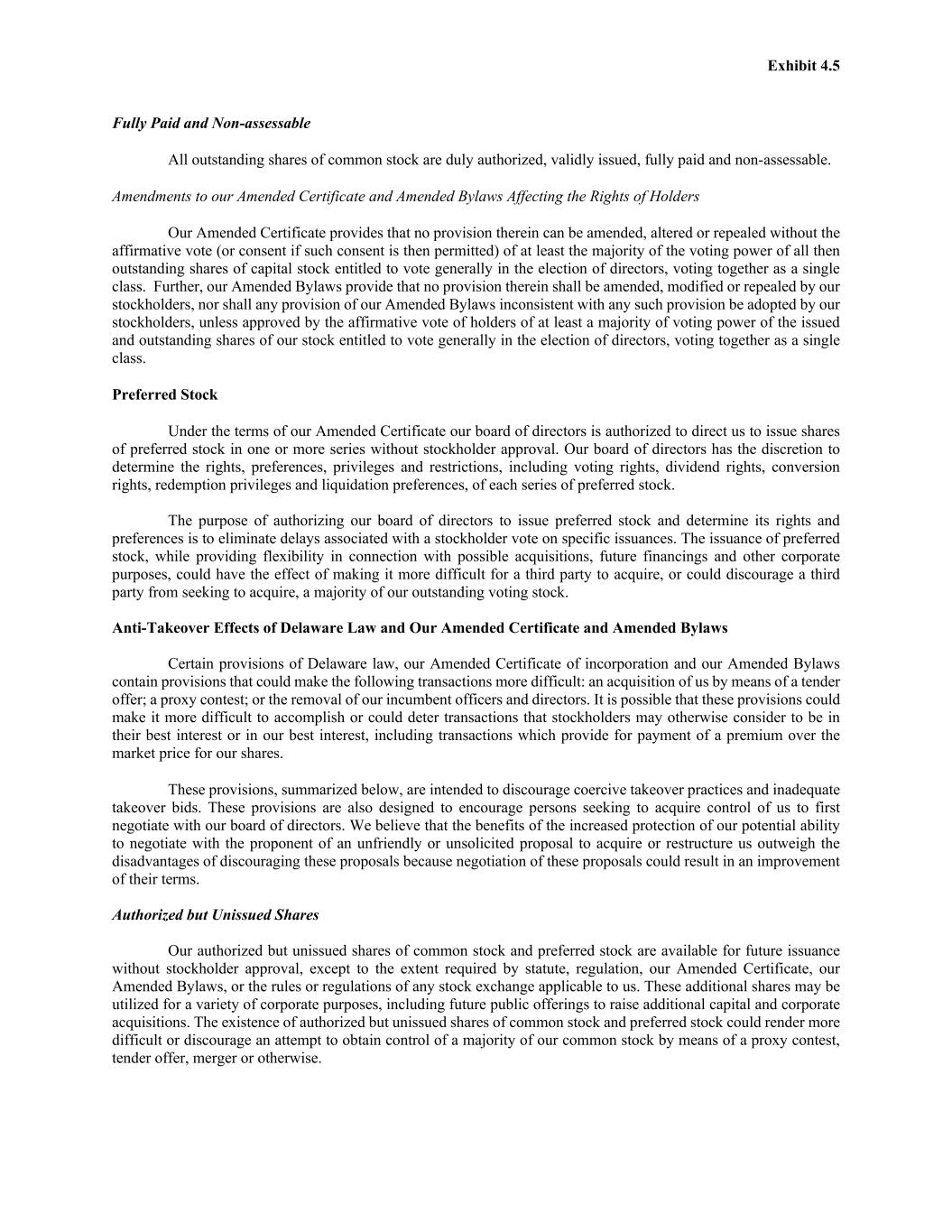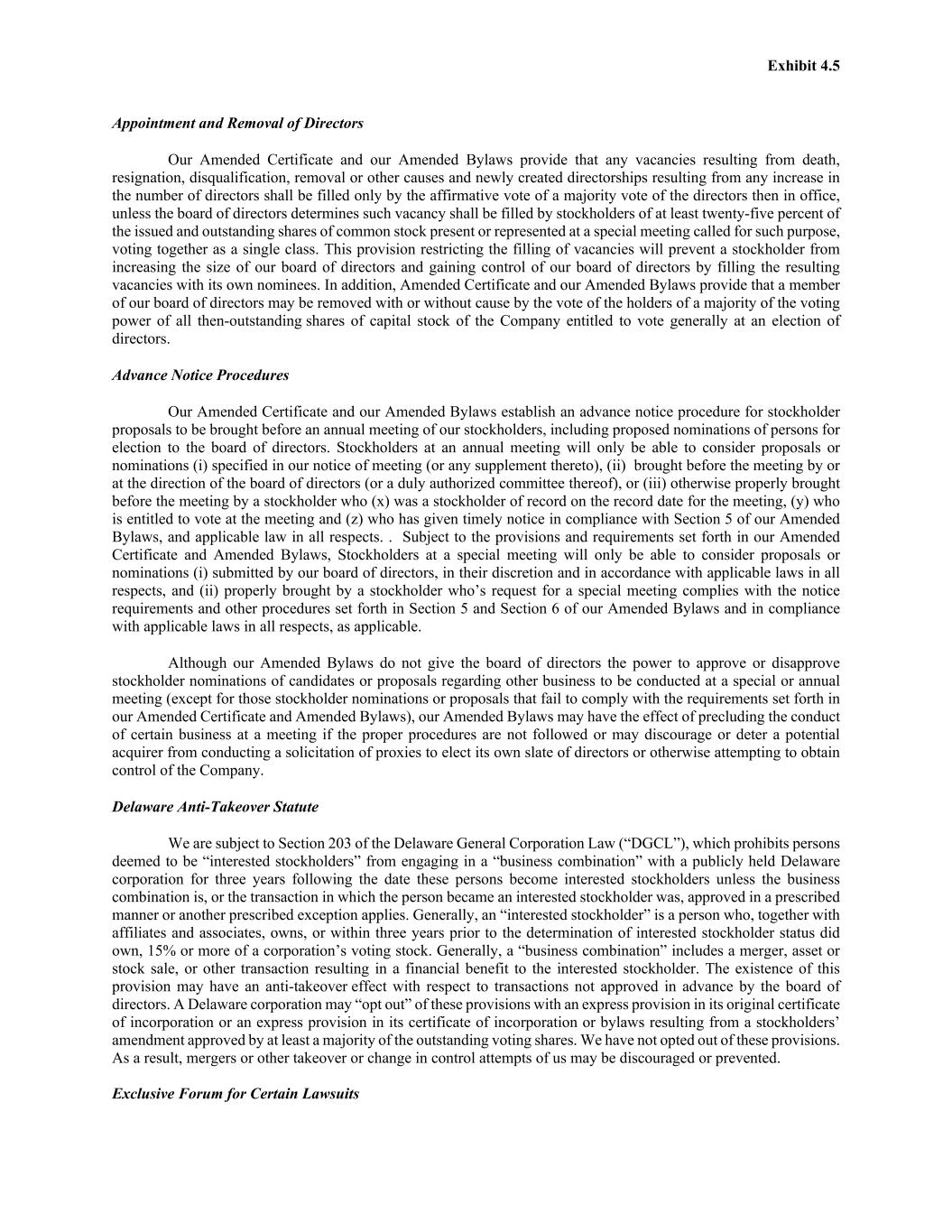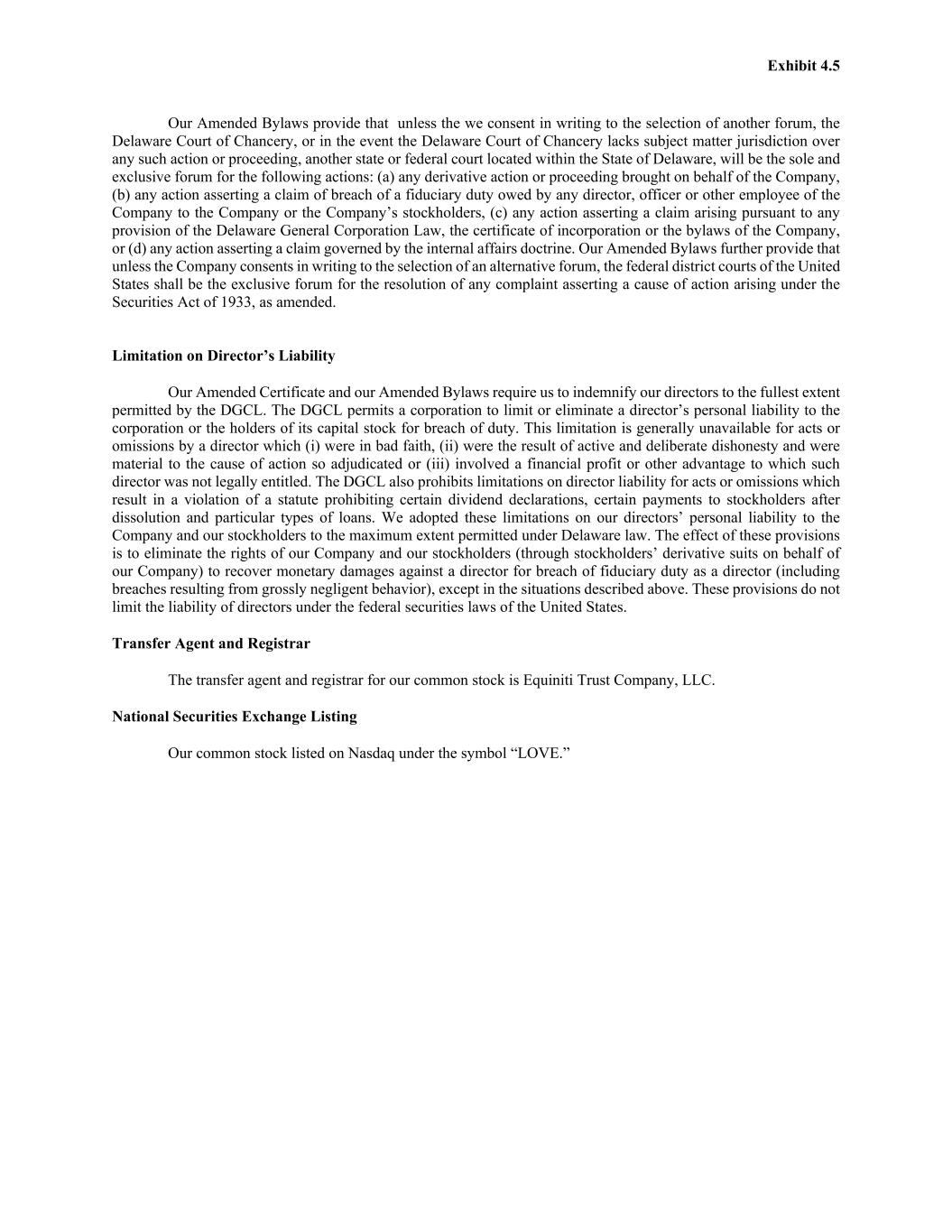
Exhibit 4.5 DESCRIPTION OF REGISTRANT’S SECURITIES REGISTERED PURSUANT TO SECTION 12 OF THE SECURITIES EXCHANGE ACT OF 1934 The following description of our capital stock is intended as a summary only and therefore is not a complete description of our capital stock. This description is based upon, and is qualified by reference to, our amended and restated certificate of incorporation (the “Amended Certificate”), our amended and restated bylaws (the “Amended Bylaws”) and applicable provisions of Delaware corporate law. You should read our Amended Certificate and Amended Bylaws, which are filed as exhibits to our Annual Report on Form 10-K, to which this exhibit is also appended. Our authorized capital stock consists of 40,000,000 shares of common stock, par value $0.00001 per share, and 10,000,000 shares of preferred stock, par value $0.00001 per share. Our common stock is the only class of securities registered under Section 12 of the Securities Exchange Act of 1934, as amended (the “Exchange Act”). Common Stock Voting Rights The holders of our common stock are entitled to one vote for each share held of record on all matters submitted to a vote of the stockholders, including the election of directors, and do not have cumulative voting rights. Except as otherwise authorized or required by statute, regulation, our Amended Certificate, our Amended Bylaws, or the rules or regulations of any stock exchange applicable to us, in which case such different or minimum vote shall be the applicable vote on the matter, (i) in all matters other than the election of directors, the affirmative vote of the majority of shares of such class or classes or series cast and entitled to vote thereon shall be the act of such class or classes or series of stockholders, (ii) for the election of directors, the plurality of votes cast, voting together as a single class, shall be the act of such class or classes or series of stockholders, except for (a) such elections which relate to the election for directorship positions caused by either death, resignation, disqualification, removal or other causes, or (b) which relate to the election for directorship positions resulting from any increase in the number of directors, in either case, such positions shall be filled, if filled by a vote of stockholders, by a vote of stockholders holding at least twenty-five percent of the issued and outstanding shares of common stock present or represented at a special meeting of stockholders called for such purpose, voting together as a single class. Lastly, any election of directors or other action by our stockholders that can be effected at an annual or special meeting of stockholders can be effected by written consent without a meeting so long as such written consent is signed by the holders of at least the number of shares required to approve such action at a duly held annual or special stockholders meeting at which all shares entitled to vote thereon were present and voted. Dividends Subject to limitations under Delaware law and preferences that may be applicable to any then outstanding preferred stock, holders of common stock are entitled to receive ratably those dividends, if any, as may be declared by our board of directors out of legally available funds. Liquidation In the event of any voluntary or involuntary liquidation, dissolution or winding up of our affairs, the holders of our common stock will be entitled to share ratably in the net assets legally available for distribution to stockholders after the payment of or provision for all of our debts and other liabilities, subject to the prior rights of any preferred stock then outstanding. Rights and Preferences Holders of common stock have no preemptive or conversion rights or other subscription rights and there are no redemption or sinking funds provisions applicable to the common stock.

Exhibit 4.5 Fully Paid and Non-assessable All outstanding shares of common stock are duly authorized, validly issued, fully paid and non-assessable. Amendments to our Amended Certificate and Amended Bylaws Affecting the Rights of Holders Our Amended Certificate provides that no provision therein can be amended, altered or repealed without the affirmative vote (or consent if such consent is then permitted) of at least the majority of the voting power of all then outstanding shares of capital stock entitled to vote generally in the election of directors, voting together as a single class. Further, our Amended Bylaws provide that no provision therein shall be amended, modified or repealed by our stockholders, nor shall any provision of our Amended Bylaws inconsistent with any such provision be adopted by our stockholders, unless approved by the affirmative vote of holders of at least a majority of voting power of the issued and outstanding shares of our stock entitled to vote generally in the election of directors, voting together as a single class. Preferred Stock Under the terms of our Amended Certificate our board of directors is authorized to direct us to issue shares of preferred stock in one or more series without stockholder approval. Our board of directors has the discretion to determine the rights, preferences, privileges and restrictions, including voting rights, dividend rights, conversion rights, redemption privileges and liquidation preferences, of each series of preferred stock. The purpose of authorizing our board of directors to issue preferred stock and determine its rights and preferences is to eliminate delays associated with a stockholder vote on specific issuances. The issuance of preferred stock, while providing flexibility in connection with possible acquisitions, future financings and other corporate purposes, could have the effect of making it more difficult for a third party to acquire, or could discourage a third party from seeking to acquire, a majority of our outstanding voting stock. Anti-Takeover Effects of Delaware Law and Our Amended Certificate and Amended Bylaws Certain provisions of Delaware law, our Amended Certificate of incorporation and our Amended Bylaws contain provisions that could make the following transactions more difficult: an acquisition of us by means of a tender offer; a proxy contest; or the removal of our incumbent officers and directors. It is possible that these provisions could make it more difficult to accomplish or could deter transactions that stockholders may otherwise consider to be in their best interest or in our best interest, including transactions which provide for payment of a premium over the market price for our shares. These provisions, summarized below, are intended to discourage coercive takeover practices and inadequate takeover bids. These provisions are also designed to encourage persons seeking to acquire control of us to first negotiate with our board of directors. We believe that the benefits of the increased protection of our potential ability to negotiate with the proponent of an unfriendly or unsolicited proposal to acquire or restructure us outweigh the disadvantages of discouraging these proposals because negotiation of these proposals could result in an improvement of their terms. Authorized but Unissued Shares Our authorized but unissued shares of common stock and preferred stock are available for future issuance without stockholder approval, except to the extent required by statute, regulation, our Amended Certificate, our Amended Bylaws, or the rules or regulations of any stock exchange applicable to us. These additional shares may be utilized for a variety of corporate purposes, including future public offerings to raise additional capital and corporate acquisitions. The existence of authorized but unissued shares of common stock and preferred stock could render more difficult or discourage an attempt to obtain control of a majority of our common stock by means of a proxy contest, tender offer, merger or otherwise.

Exhibit 4.5 Appointment and Removal of Directors Our Amended Certificate and our Amended Bylaws provide that any vacancies resulting from death, resignation, disqualification, removal or other causes and newly created directorships resulting from any increase in the number of directors shall be filled only by the affirmative vote of a majority vote of the directors then in office, unless the board of directors determines such vacancy shall be filled by stockholders of at least twenty-five percent of the issued and outstanding shares of common stock present or represented at a special meeting called for such purpose, voting together as a single class. This provision restricting the filling of vacancies will prevent a stockholder from increasing the size of our board of directors and gaining control of our board of directors by filling the resulting vacancies with its own nominees. In addition, Amended Certificate and our Amended Bylaws provide that a member of our board of directors may be removed with or without cause by the vote of the holders of a majority of the voting power of all then-outstanding shares of capital stock of the Company entitled to vote generally at an election of directors. Advance Notice Procedures Our Amended Certificate and our Amended Bylaws establish an advance notice procedure for stockholder proposals to be brought before an annual meeting of our stockholders, including proposed nominations of persons for election to the board of directors. Stockholders at an annual meeting will only be able to consider proposals or nominations (i) specified in our notice of meeting (or any supplement thereto), (ii) brought before the meeting by or at the direction of the board of directors (or a duly authorized committee thereof), or (iii) otherwise properly brought before the meeting by a stockholder who (x) was a stockholder of record on the record date for the meeting, (y) who is entitled to vote at the meeting and (z) who has given timely notice in compliance with Section 5 of our Amended Bylaws, and applicable law in all respects. . Subject to the provisions and requirements set forth in our Amended Certificate and Amended Bylaws, Stockholders at a special meeting will only be able to consider proposals or nominations (i) submitted by our board of directors, in their discretion and in accordance with applicable laws in all respects, and (ii) properly brought by a stockholder who’s request for a special meeting complies with the notice requirements and other procedures set forth in Section 5 and Section 6 of our Amended Bylaws and in compliance with applicable laws in all respects, as applicable. Although our Amended Bylaws do not give the board of directors the power to approve or disapprove stockholder nominations of candidates or proposals regarding other business to be conducted at a special or annual meeting (except for those stockholder nominations or proposals that fail to comply with the requirements set forth in our Amended Certificate and Amended Bylaws), our Amended Bylaws may have the effect of precluding the conduct of certain business at a meeting if the proper procedures are not followed or may discourage or deter a potential acquirer from conducting a solicitation of proxies to elect its own slate of directors or otherwise attempting to obtain control of the Company. Delaware Anti-Takeover Statute We are subject to Section 203 of the Delaware General Corporation Law (“DGCL”), which prohibits persons deemed to be “interested stockholders” from engaging in a “business combination” with a publicly held Delaware corporation for three years following the date these persons become interested stockholders unless the business combination is, or the transaction in which the person became an interested stockholder was, approved in a prescribed manner or another prescribed exception applies. Generally, an “interested stockholder” is a person who, together with affiliates and associates, owns, or within three years prior to the determination of interested stockholder status did own, 15% or more of a corporation’s voting stock. Generally, a “business combination” includes a merger, asset or stock sale, or other transaction resulting in a financial benefit to the interested stockholder. The existence of this provision may have an anti-takeover effect with respect to transactions not approved in advance by the board of directors. A Delaware corporation may “opt out” of these provisions with an express provision in its original certificate of incorporation or an express provision in its certificate of incorporation or bylaws resulting from a stockholders’ amendment approved by at least a majority of the outstanding voting shares. We have not opted out of these provisions. As a result, mergers or other takeover or change in control attempts of us may be discouraged or prevented. Exclusive Forum for Certain Lawsuits

Exhibit 4.5 Our Amended Bylaws provide that unless the we consent in writing to the selection of another forum, the Delaware Court of Chancery, or in the event the Delaware Court of Chancery lacks subject matter jurisdiction over any such action or proceeding, another state or federal court located within the State of Delaware, will be the sole and exclusive forum for the following actions: (a) any derivative action or proceeding brought on behalf of the Company, (b) any action asserting a claim of breach of a fiduciary duty owed by any director, officer or other employee of the Company to the Company or the Company’s stockholders, (c) any action asserting a claim arising pursuant to any provision of the Delaware General Corporation Law, the certificate of incorporation or the bylaws of the Company, or (d) any action asserting a claim governed by the internal affairs doctrine. Our Amended Bylaws further provide that unless the Company consents in writing to the selection of an alternative forum, the federal district courts of the United States shall be the exclusive forum for the resolution of any complaint asserting a cause of action arising under the Securities Act of 1933, as amended. Limitation on Director’s Liability Our Amended Certificate and our Amended Bylaws require us to indemnify our directors to the fullest extent permitted by the DGCL. The DGCL permits a corporation to limit or eliminate a director’s personal liability to the corporation or the holders of its capital stock for breach of duty. This limitation is generally unavailable for acts or omissions by a director which (i) were in bad faith, (ii) were the result of active and deliberate dishonesty and were material to the cause of action so adjudicated or (iii) involved a financial profit or other advantage to which such director was not legally entitled. The DGCL also prohibits limitations on director liability for acts or omissions which result in a violation of a statute prohibiting certain dividend declarations, certain payments to stockholders after dissolution and particular types of loans. We adopted these limitations on our directors’ personal liability to the Company and our stockholders to the maximum extent permitted under Delaware law. The effect of these provisions is to eliminate the rights of our Company and our stockholders (through stockholders’ derivative suits on behalf of our Company) to recover monetary damages against a director for breach of fiduciary duty as a director (including breaches resulting from grossly negligent behavior), except in the situations described above. These provisions do not limit the liability of directors under the federal securities laws of the United States. Transfer Agent and Registrar The transfer agent and registrar for our common stock is Equiniti Trust Company, LLC. National Securities Exchange Listing Our common stock listed on Nasdaq under the symbol “LOVE.”